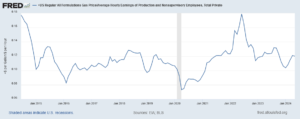June 22, 2024
The media have told us endlessly how people can no longer afford things due to higher prices and the fact that wages have risen more doesn’t matter. I wouldn’t want to disagree with the experts, but suppose we just did a little calculation about how much time it takes a typical worker to earn enough money to buy a gallon of gas.
Here’s the picture going back a decade.

This takes the price of a gallon of gas and divides it by the average hourly earnings for production and non-supervisory workers. This is a category that covers roughly 80 percent of the workforce, but excludes most high-end earners like managers, professionals, and Wall Street types. This means that it cannot be skewed by the big bucks going to the top.
As can be seen, gas prices did jump a lot relative to wages in the spring of 2022, following Russia’s invasion of Ukraine. At the peak, in June of 2022, it took 0.179 hours of work (10.7 minutes) to pay for a gallon of gas.
That was more than twice as high as low hits during the pandemic when the economy was shut down, although it was not that high by historical standards. Gas cost more than 0.20 hours of work (12 minutes) at points in 2011 and it peaked at 0.224 hours of work (13.5 minutes) in July of 2008.
But June 2022 was two years ago, and the oil markets have largely stabilized since then. The most recent figure is 0.12 hours (7.2 minutes). That’s still a lot higher than when the economy was shut down. (Donald Trump seems to think those were glory days – gas was less than $2.00 a gallon, but we couldn’t leave our homes.) But the current 0.12 hours cost of gas doesn’t look bad compared to prior periods.
For example, in 2018, it took as much as 0.128 hours (7.7 minutes) to pay for a gallon of gas. In 2019 gas peaked at 0.122 hours (7.3 minutes) of labor in May. It’s understandable people would want cheaper gas, just like they want higher pay. But the reality is that it is not especially high by historical standards, including what we saw in the recent past.
The spread of electric cars in the U.S. and elsewhere is likely to send gas prices lower in the years ahead. Electric car buyers will of course not especially care about gas prices, but more people buying electric cars will mean cheaper gas prices for those who don’t. (No, that’s not especially fair, just the reality.) Anyhow, the basic story is gas prices are actually pretty low today compared to what people earn, but that doesn’t mean the media should not yell about gas being unaffordable.







Comments